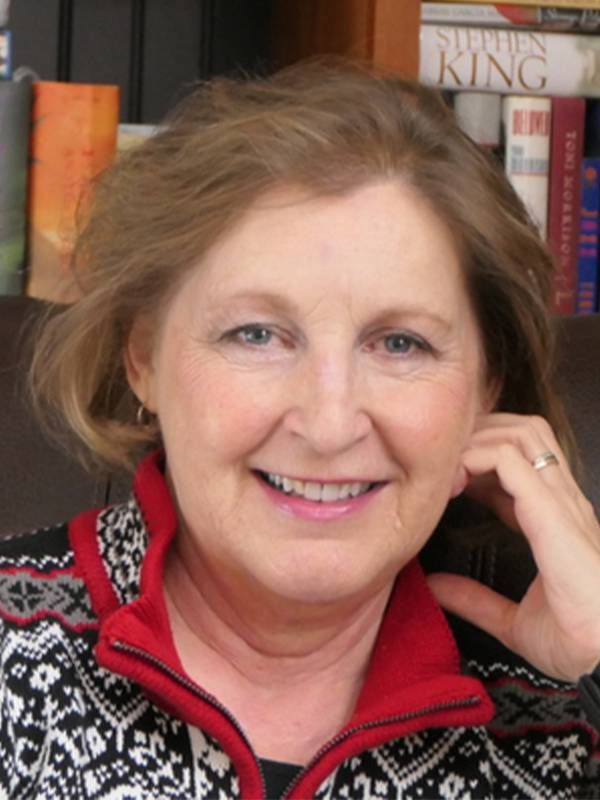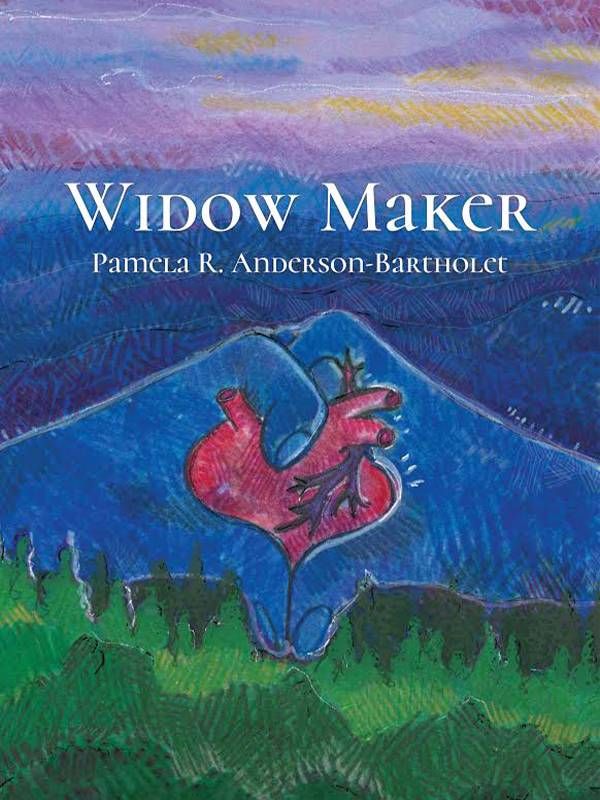"Widow Maker" Leads to Poetic Outcome
Following her husband's near-fatal heart attacks, Pamela Anderson-Bartholet found emotional healing by writing poetry
If it hadn't been for a quick-thinking desk clerk at the hotel, she might not have known her husband was sick.
If it hadn't been for an understanding highway patrol officer, she might not have found the airport.
If it hadn't been for a cardiologist's experience, her husband might not have lived.

And if it hadn't been for her habit of documenting her life in poetry, Pamela Anderson-Bartholet might not have written "Widow Maker."
In just 26 poems, Anderson-Bartholet shares the progression of her husband Al Bartholet's multiple heart attacks and recovery, and their family's experience with shock and healing.
You might not think to translate such a crisis into art, but for Anderson-Bartholet, poetry is the most natural outlet.
"It was just my way of expressing myself," she said. "I love poetry because I can revise and work it out on the page."
'This is Going to Be Really Bad'
There was a lot to work out for the couple. In June 2015, both were on business that took them away from their Virginia home on the day Bartholet collapsed.
"She said, 'Why don't you pull over? Just take all the time you need, and once you're in a safe place, let me know.'"
She was in North Carolina, and he was in a hotel in Washington, DC. The desk clerk called Anderson-Bartholet but the only information he had was that her husband had been taken to George Washington University Hospital. So she started the five-hour drive north. Her phone rang again.
"The doctor came on, one of the cardiologists in ER, and I said, 'I can keep talking to you because I'm hands-free in my car.' She said, 'Why don't you pull over? Just take all the time you need, and once you're in a safe place, let me know.' And I thought, 'This is going to be bad. This is going to be really bad.'"
As Anderson-Bartholet recalls the moment, her speech slows down, and she chokes up.
"I finally pulled over, and she said, 'He's had a series of cardiac arrests at this point. He had two in the ambulance. We have him in the ER, and he's had a couple more cardiac arrests. We're trying to find the blockage. And every second counts. We're doing everything we can.'
"Then I thought, I can't drive it," Anderson-Bartholet said. "I'm going to go to the closest airport. The rain is falling, falling, falling, and I'm driving, driving, driving, and I cannot find the airport."

The next part of the story is as sweet as it is horrifying. Anderson-Bartholet saw that a state highway patrol officer had pulled over on the side of the road. She got the officer's attention and broke down in tears.
"I said, 'I have to find the airport, and I can't find it.' And he said, 'Are you sure you can drive?' I was a wreck. And I said, 'I'm sure I can drive. I just have to get to the airport,'' she explained. "And he said, 'Just follow me.' And he guided me to the airport."
Stenosis or narrowing of the left anterior descending (LAD) artery — the technical description for the heart attack known as "the widow maker" — is often deadly. The odds were stacked against Bartholet, and his wife knew it from the beginning.
"Several doctors told us several times that ninety percent of all people just don't make it with the widow maker. When the doctor came in and visited us [in ICU], she said to Al, 'When you came in, we thought you were dead.' Five times his heart stopped."
Her husband's surgery was successful. In slightly more than hour, doctors revived him multiple times, found the blockage and inserted a stent. His recovery took several months. Her emotional recovery took just as long.
Turning to Poetry as Therapy
"I felt like my senses were exposed. Everything I was seeing — everything — was this bright color, like a big spotlight shining on things, which is so exhausting. We were both exhausted," she said.
Anderson-Bartholet turned to poetry as her therapy. She has been writing since childhood. She studied English and has a master of fine arts in poetry.
"It's always a part of us, but it's not the only thing. It's 'a' thing."
"Once I started to write, and unleashed that, it was so much more freeing," she said. "I didn't talk about it for a long time. I just wrote and wrote and wrote."
Anderson-Bartholet continued, "I'm a lover of prose, but I can't work on that massive canvas. It's too much for me. Poetry allows me to take a single idea that expresses that particular feeling or thought. When I put it on a page, it's almost like putting it in a box. Then I've captured that, and I can move on from it in a different way."
Poetry was only part of the healing.
"The writing helped, and it helped to have tasks like organizing his pills or being vigilant with what he was eating. The writing helped a lot, but then" — and here her voice gets light and bright — "I started practicing yoga."
Yoga gives Anderson-Bartholet a focus, just as poetry does.

"I found that if I was standing on one foot, trying not to fall over, it was the only thing I could think about. I couldn't think about the past, which was so painful, and I couldn't worry about the future, which felt so tenuous. I had to think about that pose in that second."
It's been almost six years since Al Bartholet collapsed. The couple lives in Ohio now. They are taking the non-medical advice of one of his doctors.
"'Don't turn into a cardiac cripple,'" Anderson-Bartholet quoted the doctor. "That's someone who is afraid to do anything in the future. It's always a part of us, but not it's not the only thing. It's 'a' thing. And so just move on from that to enjoy family and friends and other experiences."
Anderson-Bartholet's poetry now benefits other families with similar experiences. Her book is distributed by a local hospital to people going through cardiac rehabilitation.
"To help them understand they are absolutely not alone," she said. "Somebody else is dealing with the metrics and the pills and the fear… and the triumph of getting through. And still, here we are, and it's a beautiful day."
An Excerpt from "Widow Maker"
What Color Are the Blue Ridge Mountains?
…I ask my husband as we drive
east on Route 33 toward Skyline Drive
and the Shenandoah National Park.
We debate this question
as if it were the most vital issue of the day.
Dusty blue. Gray blue.
It is three weeks exactly since his world stopped
five times: Twice in the ambulance, thrice in ER.
Widow maker, a surgeon told us.
A miracle he survived, said another.
And it does seem like a miracle right now,
our car cruising comfortably at 60. John Martyn's
Solid Air whispering through the sound system. My hand
snugged into his and resting on the console between us.
Smoky blue. Shadow blue.
We don't talk about the days he lost in ICU,
plumber's auger down his throat and balloon pump
doing his heart's work.
When I explain to friends, I demonstrate:
This is his heart, I say, making a fist
with my left hand. Over the top
I wrap my right thumb, index and middle fingers
These are his arteries.
In the webbing between index and middle,
that's where it happened. Where a speck
stoppered his heart like a cork in a wine bottle
Ocean blue. Rain cloud blue.
I don't mention my newest nightmare:
A dog that lunged at me then snapped its jaws
around my demonstration fingers.
The way my free digits gripped its snout,
bearing down and dragging the beast toward me,
our eyes locked and terror growing.
Steel blue. Slate blue.
We drive, and I want to keep going,
past our street and up the steep, curving highway.
Past the fear that my heart might continue beating
after his is done.


